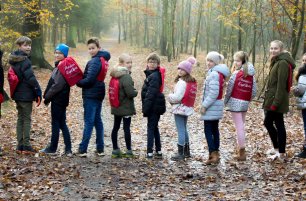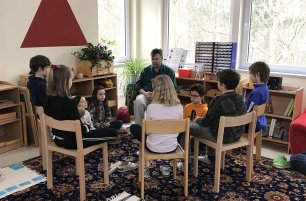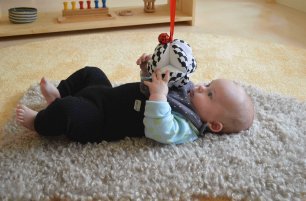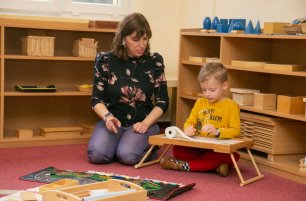Staff Interview: Greg McCracken
What is a motto that you live by? When I was young, my dad often reminded me: “Always do your best.” In the same way, what I often try to keep in mind is "Do what you can, where you are, with what you have."
How were you first introduced to Montessori?
Like many others, I discovered it through my children. Looking for a program for my son, we visited a Montessori school without knowing anything about it. I really liked it, especially the way the teachers talked to the children. It seemed very warm and nurturing.
Later, when my third son was having some issues, I volunteered in the classroom and the staff encouraged me to pursue teaching. I started tutoring at 17 so I had been teaching for a long time before stepping into the classroom; I found I really liked it and the students responded well to me. I was hesitant though because it seemed like an enormous weight – to be responsible for educating young minds. I’m still aware of the great responsibility but I now understand there’s a way to manage it.

Before you became a Montessori teacher, you studied English and Comparative Literature. What was your original plan?
My degree took a long time to complete because of family responsibilities. Originally, the plan was to go to grad school and teach creative writing at the university level. However, my family had to shift gears and my path changed. I do use what I learned in college and working with older students now with the children.
How did your passion for outdoor education develop?
That has always been a life-long interest. I grew up on a farm. The woods have always been a rejuvenating and safe place – something I want to share with the children. Learning about the outdoors has to go beyond the classroom and luckily the schools I’ve worked for have agreed. Outdoor education is really important for children – for their well-being and calm but it's also proven to have a positive cognitive impact on people.
Do you feel like there is a difference in education from when you started teaching to now?
I feel that, when I first started, children were more receptive to new things. Now, for whatever reason, they don’t seem to have the same reverence as before. Perhaps this is due to having more access and less mystery. As a teacher, I’ve remained largely the same. I try to be open and sensitive to each child.
You hold the AMS Elementary I-II diploma, what is your favorite thing about Upper Elementary children?
The conversation! They’re at a developmental level where they are discovering and forming their own ideas. This offers real opportunities to help them figure out, not tell them, what they think. I experienced that with my 5th grade teacher, Mr. Albertini, who was the most influential teacher I had. He asked me what I thought, and it was the first time someone had given me that space. And that’s what I try to give to my students.
What would you tell parents if you had the chance to share some life experience with them?
Be patient. If you’re supportive of your children, offer them love and guidance (including boundaries), it will be okay. There will be struggles but the stress will lessen.
You’re an avid traveler – what’s in it for you?
I’m a big history nerd so I love going to places and learning about cultures and people. I meet a lot of people who are “5-minute friends.” We chat, deeply, and then move on. I really enjoy seeing the common threads we all share. At the end of the day, we’re all just living our lives as best we can.
What does your life look like outside of IMSP?
Outside of IMSP my life revolves around Joyce, travel, playing and listening to music, reading, photography, movies, art and nature.
Describe yourself in 10 seconds
Someone who loves learning, other people and hearing their stories, the woods and nature, teaching, music and art, walking, traveling and getting to know new places; and who wants to share all of those with others.

Five Writers I Love, in no particular order, except #1:
1. William Shakespeare
2. Anton Chekhov
3. Emily Dickinson
4. Jane Austen
5. Haruki Murakami




